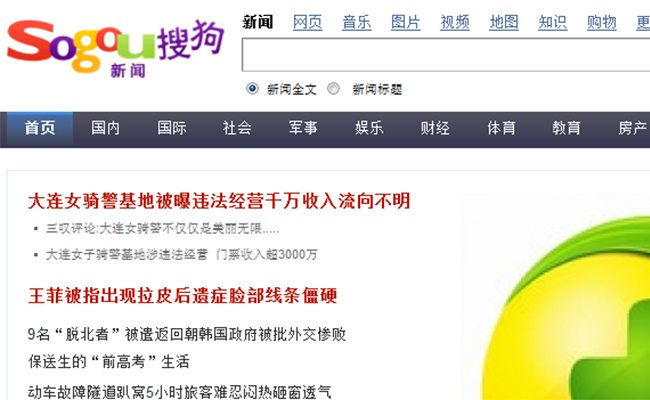
Chinese search engine lightweight, Sogou, has recently garnered industry-wide attention and sparked rumors of a takeover by heavyweight Baidu. What’s all the fuss about?
Sogou, literally translated as “Search Dog”, is one of China’s largest search engines with approximately 400 million active users. The search engine couples unique Chinese language keyword input software with a user-friendly search browser and portal access point. As of May 2013, Sogou, which is part of Chinese internet company Sohu, was ranked 91 globally by internet traffic monitor, Alexa. Surprisingly though, it is hardly China’s search engine top dog.
According to He Chuan, Visiting Professor of Marketing at CKGSB, Sogou occupies only 2% of the Chinese search engine market and is not yet a threat to market leader Baidu. Despite this, Sogou has recently garnered industry interested and stirred rumours of a potential purchase by one of its competitors, Baidu, Qihoo360 or Tencent.
Professor He spoke with CKGSB Knowledge about China’s search engines, Sogou and how the company’s acquisition could change the industry dynamics.
Q. Could you describe the Chinese internet landscape? How does it compare to online industries in the US?
A. The most striking phenomena in China have been the meteoric rise of internet and mobile platforms. China has the largest user base in the world in terms of internet users and mobile users. In terms of the major players, one has to look at few different categories. For example, in social media in China the major players are Sina and Tencent. We also have search advertisers. Baidu obviously is the biggest. Qihoo 360 and Sogou (Sohu) are the really, really distant second and third. The third category would be the mobile platforms. Baidu and Sina are making inroads in the mobile platform, but since the mobile platform is an emerging platform, I don’t see anything like, say, Facebook in the US in China. The fourth platform would be the social advertising networks (shopping networks) such as Alibaba’s Taobao, they have search engine integrated into an e-commerce platform.
In terms of the difference between China and the US, I would say China followed the American path a lot, the fundamental differences are not clear to me. They’re unique in the sense that only these two countries have all these platforms. Google is blocked in China, Facebook is blocked in China so that has allowed China to develop indigenous platforms such as Baidu, and the upcoming mobile players (such as Tencent’s Weixin).
Q. What does Sogou offer its users which differentiates the service from other Chinese search advertising services?
A. Sogou itself is a search engine but it’s really an arm of Sohu, which has a large portfolio of products ranging from real estate to mobile. Sohu is mostly known for online games. They are also well known for their Chinese input software, Sogou Pinyin (the phonetic system for transcribing the Chinese into Latin script in China), which is actually the most popular Chinese input software in China. It has over 400 million downloads. If you’re a Chinese language user, you can appreciate the usability of the software.
I don’t think that any of these players (Chinese search engines such as Baidu, Qihoo and Sogou) has a technological edge against other competitors. They’re all using very similar technology. In Sogou’s case, they use a traditional search algorithm, and then they have pinyin input and they also have a web browser. So they can collect user information from all of these different platforms. For example, through the browser they can track which websites you visit, that gives them a lot of information about you.
If you look at their technology, it’s actually very good. Their relatively small market share is not because of lack of technology or lack of investment; it’s a lack of a major breakthrough. I would even speculate that technologically, it is on a par with Baidu. But not better—so why would people switch? To give an analogy, at the beginning, the iPhone was probably the best (smartphone). These days though, if you compare the iPhone with a Windows phone, for example, they’re very comparable. Windows phones are fast catching up in terms of the features and user interface, but they are not seeing a whole lot of adoption. Sogou is probably the Windows phone of search engines—it’s pretty good but why would you switch from another platform?
Q. Sogou and it’s parent company Sohu has been compared to Yahoo! in the US. Did Sogou originate as a copycat? How are the companies similar and different?
A. No, I don’t think they’re a copycat. They’re similar in principle. They both have very diversified portfolios, they’re both pioneers in their respective markets. Yahoo! was a pioneer in the US. Here in China, Sogou was a pioneer. Charles Zhang (Sogou Founder and CEO), founded the company early on, definitely before Baidu entered the game.
So they were both pioneers, they both had very diversified portfolios but their fates seem to be quite different. In the US, Yahoo! is really declining and I would even say that it is out of the picture. What is Yahoo! doing and who even cares? But in China, Sohu is actually doing well in general.
In the American market, things are much more specialised—you’ve got to be the champion of something. China is at a very different stage of development. There is not an expectation that one company will provide expertise, so you can still do well by being a jack of all trades—pretty good at a lot of things but not great at anything. The fact is Sohu is doing well, and it really does a lot of things, it has real estate, online games, online videos and multimedia.
Sogou is strategically important (for Sohu), but from the revenue point of view, it’s probably not that big. One thing that we learnt was that Baidu occupies 80% of the Chinese search advertising market, Sohu’s share is around 2%. One cannot imagine that it’s a big revenue contributor to the parent company. But it is strategically important.
Q. There have been rumours about a potential takeover of Sogou by another large internet company. Baidu, Qihoo and Tencent are all rumoured contenders. What would an acquisition mean for the search advertising industry in China?
A. I don’t see a lot of reason for Baidu to acquire Sogou. The market shares are so different, for Baidu, acquiring another 2% of the market share, doesn’t add much. In terms of competition, Sogou would like to think that it is a competitor of Baidu, but in terms of market share they’re so different. Unless Sogou introduced something revolutionary, or there were to be a real breakthrough, I don’t see things will change that much. There is the elimination of one small player in the market and the big guy’s market share doesn’t change very much.
Similarly, let’s say Qihoo and Sogou merge, with Qihoo’s market share of 10% and Sogou’s market share of around 2%. When they add up, that’s still only 12%. It’s still not a big deal. So in China it’s a virtual monopoly by Baidu, and all of the other players combined are very small.
With regard to Tencent, it has acquired a huge user base. How to monetise the user base is a huge problem. They have Tencent Weibo (a micro-blogging service) and now they have Tencent Weixin (a voice and text messaging service). They’re vastly popular but then the question is how you actually generate revenue out of it. That’s the next step and I don’t see that Sogou could add a lot in that respect because Sogou’s strengths are not in social media, but in search advertising.
How to incorporate social media and search advertising is not a trivial question. If you look, for example, at Facebook, they have not joined forces with Google. It’s developed its own search platform (Graph Search). One cannot easily leverage experience in traditional search advertising on a social media platform. They attract different users, or the users they attract have different objectives. Whether you are using the internet to conduct specific keyword searches or a social media platform to engage with your social circle, there is a different frame of mind and you can’t use the same search techniques.
I think Sogou’s technology is valuable, but the internet platform is evolving very fast and who knows, some day they might really hit it big and innovate something. When they come up with something very valuable, that would be significant. But also if that were to happen, Sohu is behind them and Sohu is big enough. I doubt that Sogou would be acquired by anybody in the near future.
I remain optimistic about this platform, in a year from now things could be quite different, especially with regard to the mobile platform, there may be a game changer but we’ll have to wait and see.

















